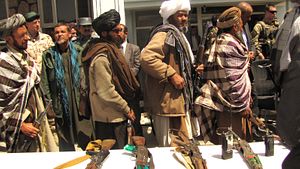Something remarkable is happening in the Taliban stronghold of southern Afghanistan. The people of Helmand province are protesting against the war and asking the government and the Taliban to stop killing civilians.
This protest would be less remarkable if it were a generic call to peace. Instead, the men and women of Helmand are planning to take the call to the Taliban, announcing that they would march to Taliban-held territory to press for their demands for a ceasefire and civilian protection. This is an act of immeasurable courage in an area where people strive to appear neutral between the government and the Taliban just to survive.
But if this movement had to come from anywhere in Afghanistan, it would be Helmand. The province has been one of the areas hardest hit by the bloody war that is increasingly preying on women and children.
The protest started spontaneously after an explosion at a sports event and comes amid efforts by the Afghan government to kickstart long-stalled peace talks. The protests are also happening around the time when the Taliban typically announce their spring offensive, their yearly battle campaign that sets out the group’s targets and tactics. The Taliban have so far dismissed the protesters’ demands, forcing them to go on hunger strike. But as the Taliban’s Pakistan-based political and military commissions finalize their battle plan, they would be well served to pay heed to Helmand.
The Taliban have always claimed that they support peace and want to minimize the suffering of Afghans. This is their opportunity to show in one of the deadliest theaters of war that they are serious. By accepting the call to a ceasefire from a grassroots movement in their own stronghold, they can communicate this through action – not just lofty, self-righteous rhetoric, as is their style.
A limited ceasefire in Helmand could save lives and put the onus on the Afghan government to take the next quantum step toward peace. For a media-savvy Taliban, this would be a propaganda coup. And it would be well-deserved. They have convincingly shown that they can make war; now they can show that they can make peace, too.
And while the Taliban are at it, they could further demonstrate moral leadership by setting their military objectives more clearly for this fighting season. In the past, they have targeted and killed civilians indiscriminately. For example, take this 2015 Taliban statement: “So long as [foreign countries] have a military presence inside our country, their civilian efforts under whatever name and title will not find security.” Conflating civilian and military objectives like this has had catastrophic consequences, like when the Taliban used an explosives-laden ambulance to attack a bustling area close to a hospital, shopping centers, and embassies. About 100 people were killed and 200 injured.
The Taliban have also threatened and attacked Afghans associated with the international presence in Afghanistan, including civilian employees at military bases, aid workers, interpreters, development professionals, health officials, and teachers.
Nobody is expecting the Taliban to stop fighting. But the protesters’ demands are just and clear: stop indiscriminately killing civilians. In practical terms, this means stopping the use of the notoriously imprecise improved explosive devices; not fighting near hospitals, schools, mosques, and people’s homes; no more suicide attacks at crowded locations; not targeting civilians who work for the government. The list goes on.
The political theatrics of peacemaking – where to negotiate, under what conditions, and with whom – will continue to play out. But by taking these steps, the Taliban can save the lives of Afghans. In a war that has become a stalemate, they cannot kill their way to political legitimacy, but they could enter potential talks from a stronger moral position if they took steps to protect lives.
It is true that peace in Afghanistan remains a complex affair involving a motley of global actors with divergent agendas. Besides the Afghan government in Kabul and the Taliban, there are Russia, China, Iran, Pakistan, the United States, and India, plus, Islamic State, al-Qaeda, and Central Asian militants. Sorting through all that will take time. But making efforts to reduce civilian casualties should not.
The focus of peace efforts on regional and international realipolitik has distracted everyone for too long from what could be accomplished on the ground with little politics. The protesting mother who lost five sons and her husband is here to remind us of that. Lives could be saved if fighters stopped taking them.
Ahmad Shuja Jamal is a Fulbright scholar at Georgetown University’s McCourt School of Public Policy. He is a regular commentator on Afghanistan and regional issues and researches topics of international security and human rights.
































